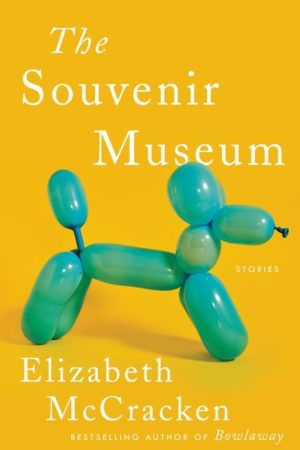The Souvenir Museum
by Elizabeth McCracken
reviewed by Jackie Thomas-Kennedy
In one of the stories in Elizabeth McCracken’s latest (and best, so far) collection The Souvenir Museum, a narrator stays at the aptly named Narcissus Hotel to drink her way through the aftermath of a breakup. Her voice is self-conscious, starting with the pleasure she takes in description: the hotel has “the gore and frill of a Victorian valentine,” a suite is “less rubescent” than the hallways, the furniture is “as blue and buttoned as honor guards.” She is one of McCracken’s many narrators who can be trusted to note the colors and textures around them—there is, in these stories, a kind of compulsive noticing, and the resultant prose is so plush that it may be read happily for the language alone, though there is much more at work here.
Although, as in her previous works, these stories bring forth elements of the carnivalesque (“A Splinter”), costumes (“The Souvenir Museum”), odd performers (“Mistress Mickle All at Sea”), and animality (“Birdsong from the Radio”), McCracken’s focus is not restricted to beauties and oddities. The heartbroken narrator in the Narcissus Hotel turns to the act of storytelling itself, and to the primary question of this collection: the question of scale, of what is large enough to matter. “How can it be that I felt like this, over so little?” she wonders. Yet McCracken’s sharp eye—for the protective gesture, the accidental admission—refutes the idea of smallness.
“Proof,” one of the finest stories in this outstanding collection, grapples with such matters of space and scale. Striking and elegiac, “Proof” is a slight departure from the territory of the amusingly bizarre. As in the majority of these stories, “Proof” is set during a trip: David Levine takes his father, Louis, on an excursion to see puffins. “He needed, he had always needed, so little,” David thinks of Louis. Later, when his father wanders away from the tour group, David imagines the story he will have to tell: “The day was lovely, till Dad fell off the cliff.” Suffering “acrophobia by proxy,” David fears “everyone else was about to fall off the mountain.” There is not enough space on the narrow cliffside for the protagonists’ abundances of love and fear, both of which play out in this brief exchange:
“I’ve lost your name,” Louis said gently.
“Daddy!” said David.
Once Louis corrects himself and calls his son by name, David reverts to “‘Dad,’” but the panicked moment leaves its mark: another cliff to fear.
In “The Irish Wedding”—the mostly beautiful, occasionally crude opening story—Sadie, an American, sees her act of driving in Ireland “as an act of heroism, though at any moment she might swerve off the road, into a ditch or off a cliff: she wasn’t sure, she couldn’t see.” Sadie’s boyfriend, Jack, an American born to British parents, struggles to fit in among his family, who “regarded him as a sort of hanger-on with a pot-metal accent.” It is a delightful surprise to encounter the couple several more times in this collection. Jack appears without Sadie in “A Splinter,” but they are together in “The Get-Go,” in which Jack meets Sadie’s formidable mother; in “Two Sad Clowns,” Sadie and Jack meet for the first time; and in the closing story, “Nothing, Darling, Only Darling, Darling,” they marry in the shadow of Jack’s nephew’s suicide. The death is made all the more devastating when the reader recalls first glimpsing the nephew, Thomas, as a child in “The Irish Wedding.”
The Jack and Sadie stories are in conversation with the collection’s overarching concerns. In “The Get-Go,” Jack must navigate a space that belongs to Sadie and her mother, Linda: “He was not her child: What was more grotesque than that American trampling of boundaries, calling your in-laws Mom and Dad [ … ]?” McCracken’s superb sense of timing for sudden violence appears in this story when Jack reaches for a dish of Jordan almonds: “Linda lunged and slapped his forearm, really slapped it, and said, in the voice of a shocked dog owner, ‘No.’” She explains to Jack, “‘I just always get those for Sadie [ … ] She loves them. They’re harder to find than they used to be.’” McCracken fills Linda’s defense with a novel’s worth of humor, tension, love, sorrow, and irrationality. There are many such moments in these stories, each of them an exploration of some form of intimacy, each of them featuring some kind of cliff to avoid falling over.
The travels undertaken by McCracken’s characters often reveal what they should have been able to see at home. In “Proof,” when David sits down in a cave and cannot get up at the gentle urging of strangers: “It was too narrow a foothold for kindness.” In “It’s Not You,” when the narrator explains her habit of glancing into other people’s hotel rooms: “Out of all these dozens of rooms, where would I be happiest, by which I mean, least like myself?” McCracken’s characters wander far without finding the route to such an escape.
Published on July 9, 2021

